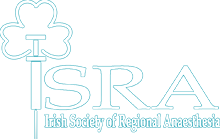Structure of Department
The Department of Anaesthesia and Critical Care of Galway University Hospitals has been a national leader in both education, research and training of regional anaesthesia for many years. There are two distinct sites for the performance of regional anaesthesia in Galway University Hospitals. Merlin Park (an elective orthopaedic service) and University College Hospital, Galway (elective orthopaedic and all other surgical specialities including both elective and emergency surgery). The service current performs approximately 2000 nerve blocks each year. The service users are patients undergoing surgery and those patients referred by the acute pain service. The department has a dedicated block bay on both sites which facilities the efficient performance of nerve blocks in patients undergoing both extremity and trunk surgery. This provides for the timely performance and assessment of all regional nerve blocks. The coordinators of the regional anaesthesia programme are Dr’s. McDonnell, Kinirons and Coughlan. Acute pain services are lead by Dr. Finnerty. A wider group of consultants are engaged in both the teaching and supervision of the regional anaesthesia fellow on a daily basis.
Rationale for Regional Anaesthesia programme
The aim of the regional anaesthesia programme is to provide safe and effective regional anaesthesia to patients deemed suitable and amenable to regional anaesthesia. The use of regional anaesthesia provides an alternative to opioid-based analgesic regimens and where applicable, an alternative to general anaesthesia. In performing these techniques, it is possible to provide improved analgesia, earlier mobilization, reduce opioid related side effects and facilitate earlier discharge from hospital. The provision of excellent perioperative analgesia may reduce the likelihood of the development of chronic pain syndromes in this patient population.
Purpose of Regional Anaesthesia programme
The purpose of this programme is to:
Rationale for Regional Anaesthesia fellowship
The aim and objectives of the Regional Anaesthesia fellowship are as follows
Potential Applicants
The fellowship in regional anaesthesia will constitute a special interest year. It is anticipated that candidates will be post CCST. The fellowship will denote a special interest in regional anaesthesia and will allow candidates to sit postgraduate exams in regional anaesthesia, thereby achieving a recognised postgraduate qualification.
Clinical Role
- To obtain a level of competency in performing regional anaesthesia that allows independent practice with remote supervision.
- To meet the experience requirements to satisfy the entry requirements of the European Diploma in Regional Anaesthesia.
- To engage in audit on both a local and national level.
Proficiency
The objective of the regional anaesthesia fellowship is to acquire the knowledge and skills required to perform the block under full proactive supervision. With experience it is anticipated that the fellow will move to a skill base requiring reactive supervision and ultimately independent activity with distant supervision ( level 5).
Clinical Practice
A Consultant supervisor is assigned to the block bay every day. A dedicated consultant anaesthetist will deliver the service, with the regional anaesthesia fellow.
The anaesthetist performing the block is responsible for:
Non-Clinical Activity
Teaching, audit, research and patient follow up will be included in the core non clinical activities of the regional fellow. The postoperative evening ward round and follow up phone call will allow documentation of problems, time to block resolution and a guide to adequacy of post-block analgesia. This documentation should be audited frequently to assess the standard of care provided to patients
Audit
All inpatients will be reviewed post operatively. Recognising that audit remains a cornerstone of practice all fellows will engage in an audit project under the mentorship of a supervising consultant. All regional anaesthesia practice is recorded in a database which will assist in the performance of this audit. It is expected that results of the audit will be the motor for practice change at a local level. Fellows will be encouraged to present/ publish their work at either a national or international level. Fellows will engage with national or multicentre audit relevant to Regional Anaesthetic practice.
Teaching
Dedicated Regional Anaesthesia teaching occurs every Thursday morning at Galway University hospital. The fellow will coordinate and participate in the Regional Anaesthesia teaching programme. The fellow will coordinate the Regional Anaesthesia Morbidity and Mortality meetings. This meeting will take place once every six months.
Where appropriate the fellow will engage in teaching Regional Anaesthesia at an undergraduate level for school of Medicine, Galway University Hospitals. The fellow will participate in the education of other health care professionals ( postgraduate nursing course).
Research
The department is an active in both clinical and basic sciences research. There are several collaborative research projects on going at the present time. The Regional anaesthesia group has strong links with the Department of Anatomy NUIG and the department of engineering GMIT. The department has developed links with industry and is a centre for the introduction of innovative products for Regional Anaesthesia. The Regional Anaesthesia research programme leader is Dr. McDonnell
Advance Qualification Opportunities
The regional anaesthesia fellow will be encouraged to obtain a specialist postgraduate qualification in Regional Anaesthesia. This includes the European Diploma in Regional Anaesthesia or the MSc in Regional Anaesthesia from the University of East Anglia, UK.
GALWAY DETAILS
OPENING HOURS
| Monday – Sunday | 24 hours |
